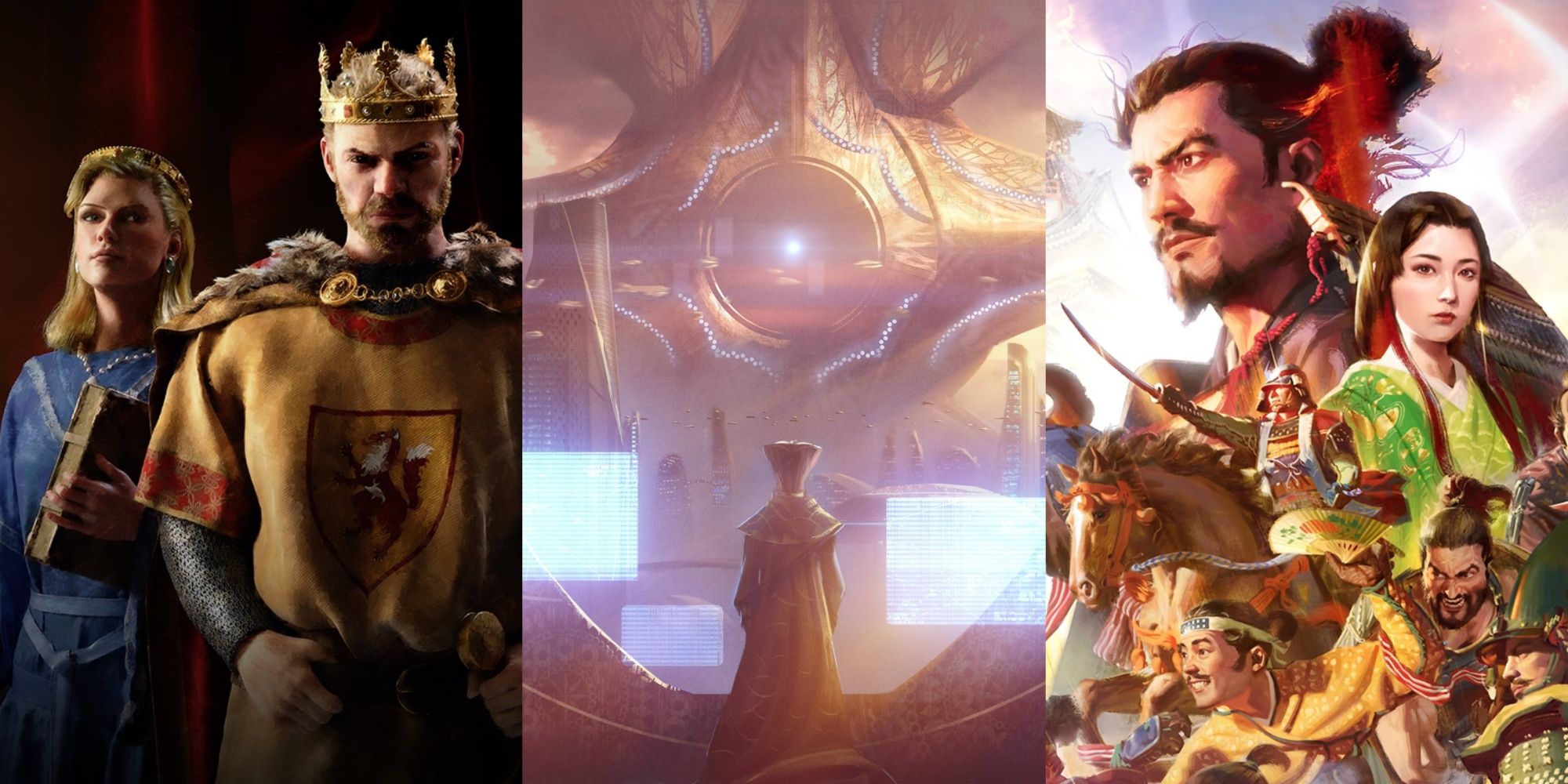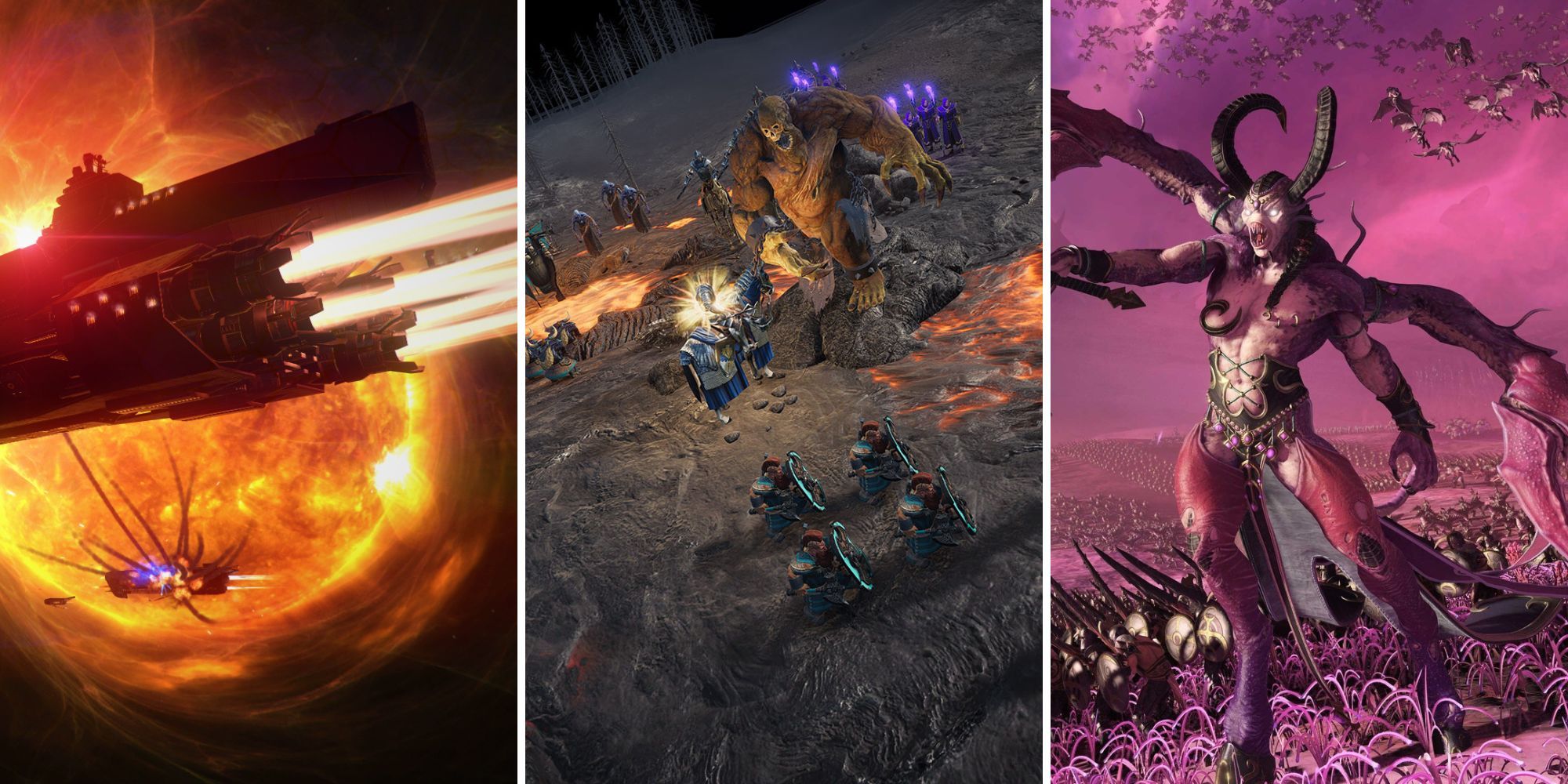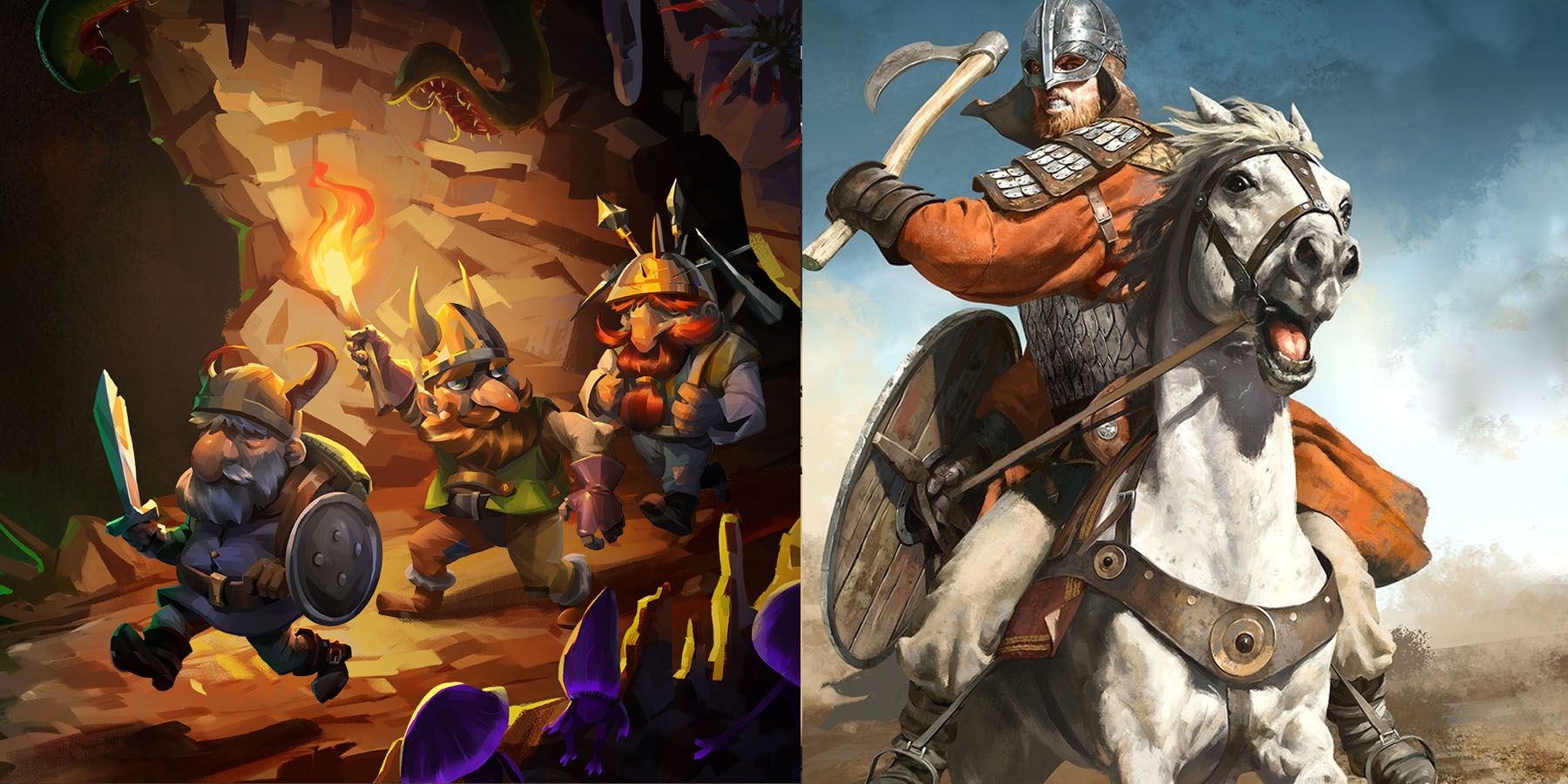Highlights
- In strategy games like Suzerain, deep relationships with allies and enemies lead to impactful consequences in gameplay decisions.
- Terra Invicta introduces an economic system involving factions influencing nations, making global relationships a key gameplay element.
- Space Empires 4 focuses on intricate political maneuvering with other races, elevating relationship management mechanics.
Diplomacy is a known vital element in a strategy game's mechanics, with players often having to juggle alliances with other nations to ensure they get aid whenever they go to war. However, certain strategy games go further and have players manage deeper ties with allies and enemies, particularly in the form of relationships that usually have massive consequences for their overall gameplay.

10 Strategy Games That Let You Play As A Villain
From Creature Lab to Ruinarch, these unique strategy games allow you to become the ultimate villain.
While other strategy titles are direct in their inclusion of relationships as a game mechanic, others are subtle in their integration of these interpersonal matters. For players who want an extra layer of tactical prowess in their strategy gameplay, certain titles might suit their fancy. However, just which strategy titles are must-plays for fans who are looking for interesting relationship components?
1 Suzerain
Narrative RPG With Strategy Elements Blends Political Theory And CYOA
Suzerain
- Platform(s)
- Nintendo Switch , Android , iOS , Microsoft Windows , macOS
- Released
- December 4, 2020
- Developer
- Torpor Games
- Genre(s)
- Strategy , RPG , Adventure , Indie Games
Suzerain in a Nutshell:
- Players take on the role of a President
- Take control of a failing economy
- Learn about your interpersonal relationships through news bulletins
The overall gameplay of Suzerain adds the weight of political theory to a traditional narrative RPG, this time ensuring that decisions don't merely lead to "good" or "bad" endings but rather have an entire nation at stake. Players take the role of newly-elected President Anton Rayne, who wants a second term by fixing as many problems in Sordland as possible: a traditionalist economy facing a crisis, mass protests that are becoming increasingly violent, as well as a potential armed conflict, among others.
Suzerain lacks direct metrics that gauge a player's relationship with others. Instead, players need to rely on updates through news bulletins and interactions with their advisors, all of which have lengthy dossiers that may give a semblance of their relationship with others and their potential hidden motives. In turn, Rayne has to juggle political priorities as he does his interpersonal relationships, as dissatisfaction among his inner circle may lead to revolts and unsavory endings.
2 Terra Invicta
Ideologies, Social Spheres Become The Economy In An Alien Invasion
Terra Invicta
- Platform(s)
- Microsoft Windows
- Released
- September 28, 2022
- Developer
- Pavonis Interactive
- Genre(s)
- Simulation , Grand Strategy
Terra Invicta in a Nutshell:
- Geopolitics in a world invaded by aliens
- Players use "stakes," the game's economic system, for geopolitical affairs
- Employ Councillors in different parts of the world to do your bidding
While not a relationship manager in the strictest of senses, conspiracies rise from the shadows to take a more direct approach to geopolitical relationships when aliens arrive in the world of Terra Invicta. The game's unique economic system involves factions having "stakes" in nations via Control Points, which are then used to influence a country's internal and external affairs. In Terra Invicta, players can steer a nation towards specific policy decisions or even dictate their diplomacy and international relations.
As a leader of a global conspiracy, players employ Councillors to accomplish tasks that steer the world closer to the ideologies of their chosen conspiracy: pro-alien, anti-alien, pure survival, or departure from Earth, among others. Global relationships have become both the playground and currency in Terra Invicta, especially when players direct Councillors to spread their ideologies, sabotage rivals, investigate aliens, and even destroy nations from within.
3 Diplomacy
Make Alliances With Others And Betray Them In The Same Turn
Developers | Paradox Interactive |
|---|---|
Platforms | PC |
Release Date | October 4, 2005 |
Metascore | 58 |
Diplomacyin a Nutshell:
- Based on the popular Diplomacy board game
- The game has three geopolitical stages: Negotiation, Movement, and Resolution
- Players have to control more than half of the world's Supply Centers to win
While not a grand strategy title despite its attempts to recreate the turbulent geopolitics pre-World War 1, the video game adaptation of the Diplomacy board game proves how futile alliances are in the face of self-preservation. The title is equal parts political and social strategy, with the winner being the player who controls more than half of the world map's Supply Centers - using any means necessary. The game is set across three stages: Negotiation where players discuss their moves, Movement where secret orders are given and played simultaneously, and Resolution where Supply Center Totals are reevaluated.
Unfortunately, the Diplomacy game adaptation falters in the board game's strongest suit: its social strategy component. This is best experienced in multiplayer, as the video game will show players why its board game source is considered among the most notorious social games out there. With a nation's movement possibly being the total opposite of their declared actions, players need to manage intricate alliances and elaborate betrayals, especially when one wrong move can turn strong allies into one's worst enemies.
4 Space Empires 4
Intricate Diplomatic Relations Demand Micromanagement
Space Empires 4
- Platform(s)
- PC
- Released
- November 7, 2000
- Developer(s)
- Malfador Machinations
- Genre(s)
- Turn-Based Strategy
Space Empires 4 in a Nutshell:
- Players take control of an entire alien civilization
- Manage resources, build ships, and interact with other alien races
- One wrong move could lead to war with other planets
While not as graphically elaborate as other grand strategy titles, 2000's Space Empires 4 sets itself apart as among the most elaborate in terms of overall mechanics. On top of traditional 4X mechanics such as managing an alien civilization from the ground up, Space Empires 4 boasts an elaborate ship-building system, resource management mechanics, as well as intricate political maneuverability with other races. It's this latter part that forms the game's relationship management mechanics, especially when the game's micromanagement potential also extends to these relationships.

7 Grand Strategy Games That Have In-Depth Stories
In terms of stories and shaping one's story, these grand strategy games provide the most immersive playground for creative players.
At its core, diplomacy in Space Empires 4 goes beyond how nations can be in states of war, alliances, or neutrality. Rather, players can interact with other civs in more precise ways. Types of relationships may include trade partnerships, research partnerships, and more precise setups where trading doesn't necessarily equate to an alliance, among other factors.
5 Solium Infernum
Basic Diplomatic Mechanics Establish An Intricate Political Game
Solium Infernum
- Platform(s)
- PC
- Released
- 2024-00-00
- Developer(s)
- League of Geeks
- Genre(s)
- Grand Strategy , Turn-Based Strategy
Solium Infernum in a Nutshell:
- Players take control of an Archfiend and work their way up to defeat other Archfiends
- Main goal is getting enough Prestige that no one questions your judgement
- Players have three diplomatic moves: Insults, demanding Prestige, sending a gift
When the throne to ruling Hell becomes vacant in Solium Infernum, players take the role of an Archfiend out to defeat up to five others to secure their reign. In this dark fantasy turn-based strategy title, the game's rather simplified combat mechanics are built to hide its more intriguing social aspect. The main goal of the game is to amass enough Prestige to ensure foes can't have any say against a player's moves. This is done with the assistance of Regent Events, Rituals, and Schemes that have various effects depending on how brazen or cunning players are at executing them.
The main diplomatic moves a player can make in Solium Infernum could be divided among three major moves: sending insults that either net free Prestige or force enemies to engage in combat, demanding Prestige or forcibly attacking to get them, or sending a gift to guarantee non-hostility or at the risk of war. These simple "if-else" factors eventually evolve into complex politicking, especially when war conditions could also get specific in terms of stakes, such as territories or combat locations.
6 Dwarf Fortress
A Dwarf's Relationship With Its Environment Affects Their Happiness
Dwarf Fortress
- Platform(s)
- Linux , macOS , Microsoft Windows
- Released
- August 8, 2006
- Developer
- Bay 12 Games, Tarn Adams, Zach Adams
- Genre(s)
- Roguelike , Strategy , Simulation
Dwarf Fortress in a Nutshell:
- The construction and management simulation elements of the game are particularly impressive
- Players have to ensure that the Drarves are happy inside the caves.
- You make contact with the outside world for trade or exchange diplomats
Despite its rather retro take on graphics, Dwarf Fortress continues to capture the hearts of both strategy and roguelike fans with its in-depth take on the potential life of a Dwarf. Compared to the turn-based sandbox Adventure Mode, it's the construction and management simulation element of Fortress Mode where the game's strategic relationship-building shines. While it's true that Dwarf Fortress takes the familiar citizen happiness mechanic of other colony sims, the game pays particular attention to how a Dwarf's relationship with their environment can affect the world around them.
For instance, outside civilizations can be made contact with to send caravans for trade or even exchange diplomats for peace agreements, unless full-blown war is engaged.
The game takes this a step further, as all Dwarves in a Fortress may potentially be related to each other. Almost all experiences in the Fortress affect a Dwarf's thoughts, and they may feel discontent if they don't get to do something they like. Having a network of friends and family can make Dwarves extremely happy as well as depressed when any one of them dies. As such, players not only have to manage the frequency of happiness triggers in their Fortress but also grapple with the fact of whether to separate or keep Dwarves close to each other to secure their optimal moods.
7 Mount And Blade 2: Bannerlord
Relationships Towards Vassals, Lords, Locations, And Factions Affect Performance
Mount and Blade 2: Bannerlord
- Platform(s)
- PC , PS4 , PS5 , Xbox One , Xbox Series X , Xbox Series S
- Released
- October 25, 2022
- Developer(s)
- TaleWorlds Entertainment
- Genre(s)
- Action RPG , Strategy
Mount And Blade 2: Bannerlord in a Nutshell:
- Players take control of a leader engaging in various battles
- While taking part in battles, players have to build important relationships.
- The dialogues and conversations play a crucial role in building alliances.
The transition between strategy and RPG components in Mount and Blade 2: Bannerlord is almost seamless in the player's eyes, creating quite a compelling simulation of a leader commanding a party of mercenaries to engage in various battles. While the endgame is certainly acquiring one's own Kingdom, Bannerlord employs a worthwhile progression to this status. Whereas players embark on quests in an overworld map, players may also actively engage in both strategic battles and building relationships with other characters.

13 Best Grand Strategy Games For Building Fictional Empires
These grand strategy games provide the ultimate power fantasy for players who wish to build their very own fictional empires.
The game features an intricate dialogue system that allows players to charm their way into forcing others to side with them, with a bartering option for bribes. Trying to repeat a failed dialogue can result in strains in relationships, potentially affecting their disposition to players. What's interesting here is that the relationship system doesn't just extend to lieges, vassals, and even spouses. Rather, players may even form relationships with villages and towns, where negative opinions could prevent recruitment or purchase of land.
8 Civilization 6
Manage Relationships For A Diplomatic Victory
Civilization 6 in a Nutshell:
- There are different relationship levels in Civ 6, including Allies, Declared friends, and Denounced
- Trade and wartime alliances play a crucial role.
- Players have to work with or against other Civs and aim to become the most powerful civilization.
Relationships with other AI civs become the crux of a Diplomatic Victory in Civilization 6, with the series' diplomacy mechanic not only providing levels of relationships but also Victory Points that could lead to early success without bloodshed. Unlike other games, Diplomacy in Civilization 6 gameplay is reflected in various relationship levels between civs, examples of which include: Allies that can't declare war but have open borders and defensive pacts, Declared Friends with likely favorable deals, or even Denounced where leaders publicly announce low opinions with each other.
Maintaining proper relationships is vital to a civ's survival, especially when trade and even wartime alliances can make or break one's survival. Building relations with other civs includes giving into their agendas and trade preferences, forming embassies and trade routes, assisting their allies, and even having common enemies.
9 Europa Universalis 4
Features Almost Mathematical Diplomacy
Europa Universalis 4
- Platform(s)
- PC
- Released
- August 13, 2013
- Developer(s)
- Paradox Development Studio
- Genre(s)
- Strategy
Europa Universalis 4 in a Nutshell:
- The game's geopolitical mechanics may feel like math due to its dependency on numbers
- Players have to assess everything before forging alliances or rivalry
- Each nation comes with a prerequisite that you must fulfill before forging an alliance with them.
Fans of Paradox Interactive titles won't find it surprising that others might feel Europa Universalis 4 is a game quite dependent on numbers, and this also extends to its diplomacy system. However, this is also where the game shines from the perspective of inter-politicking, as relationship management between players and allies can become a sensitive case of both math and extrapolation. This is more evident when playing some of its most challenging starts, as players need a more intricate assessment of diplomatic relations to survive the odds in terms of geography and resource disadvantages.
When players establish diplomatic relations in Europa Universalis 4, they do more than just marry into an alliance or lend aid by sending troops. The game forces players to establish Rivals that actively plot against them, and being allies with Rivals of other nations may result in unfavorable relations. Some nations need players to have a sizable navy or army before accepting alliances, while others need players to actively oppose another nation to even consider partnerships. While the game doesn't outright provide players with "why" these relationships are important in the game's 1444 setting and historical background, players who spend enough time in the game can see these intricate mechanics as a mini-game to secure more favorable odds.
10 Crusader Kings 3
Build A Dynasty That Will Last The Ages
Crusader Kings 3
- Platform(s)
- PS5 , Xbox Series X , Xbox Series S , PC
- Released
- September 1, 2020
- Developer(s)
- Paradox Interactive
- Genre(s)
- RPG , Grand Strategy
Crusader Kings 3 in a Nutshell:
- Players take control of entire dynasties.
- In a nutshell, players have to secure their heirs so they can survive until 1453.
- Religions, marriage, and government types play a crucial role in Crusader Kings 3.
Perhaps considered the epitome of relationship management in grand strategy titles, Crusader Kings 3 subverts genre expectations by making players manage not necessarily a kingdom but rather a dynasty. Set in either 867 or 1066, players are tasked to ensure that their family will survive until 1453. In the broader scope of things, this means players need to secure heirs regardless of whether they begin or end their playthrough with a small duchy or a grand kingdom.
Mechanics-wise, Crusader Kings 3 requires players to charm and even deceive their way to their family's survival. The wrong marriage can make or break rulerships, especially when disagreements with religion and culture can cause rifts in relationships, while government types dictate exactly who rules the kingdom. Likewise, players can enact Schemes through a separate Intrigue mechanic to blackmail their way to survival.

Best PSP Strategy Games, Ranked
Players had more than a few stellar options to choose from when it came to strategy games on the PSP.

